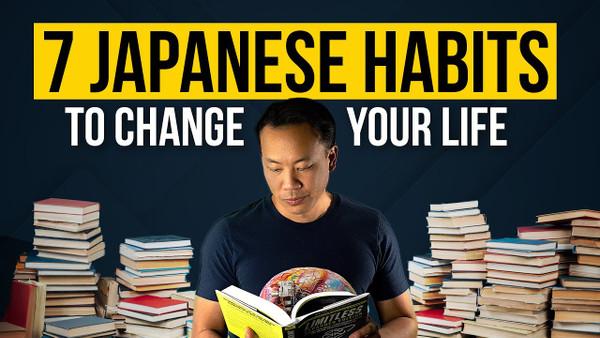7 Japanese Habits to Change Your Life
Curated from: Jim Kwik
Ideas, facts & insights covering these topics:
8 ideas
·1.84K reads
20
Explore the World's Best Ideas
Join today and uncover 100+ curated journeys from 50+ topics. Unlock access to our mobile app with extensive features.
Introduction
Who doesn't know the struggle with what Jim Kwik calls the "twin villains" of procrastination and laziness? While procrastination is a learned behavior which can be unlearned over time using the right techniques, it may help to learn about concepts that proved helpful over long years.
According to Jim Kwik, the following philosophies and techniques can help overcoming regret and self-blame, poor performance, stagnation, your personal growth and decreased productivity.
Each concept carries a unique philosophy, a cultural way of life and wisdom that stood the test of time.
59
293 reads
1. Kaizen
Kaizen is a Japanese term that translates to "continuous improvement" or "change for the better." It is a philosophy focused on continually making small, incremental improvements in processes, products, and practices.
Kaizen, at its core, encourages us to focus on small improvements by taking tiny, yet consistent steps every day.
Remember, by improving every day by 1 % over the course of a year, you become 37 % better!
By setting small, achievable goals and embracing small gains, you pave the way for lasting success and increased productivity.
72
280 reads
2. Shinrin Yoku
Shinrin Yoku is a Japanese term that translates to "forest bathing." It involves immersing oneself in nature, particularly forests, and mindfully connecting with the natural environment. The practice is based on the belief that spending time in nature has calming and therapeutic effects on the mind and body.
Benefits of Shinrin Yoku include
- reduced stress levels
- improved mood, increased focus and creativity
- strengthened immune system
- overall feeling of well-being
By engaging in Shinrin Yoku regularly, individuals can experience a sense of peace, rejuvenation, and harmony with nature.
64
250 reads
3. Ikigai
Ikigai is a Japanese concept that translates to "a reason for being" or "a reason to wake up in the morning." It refers to finding the intersection of passion, mission, profession, and vocation. By identifying your Ikigai, you can discover a sense of purpose, fulfillment, and happiness in life.
Benefits of living according to your Ikigai include
- increased motivation
- a sense of direction and clarit
- improved overall well-being
- a deeper connection to oneself and others.
Finding and living your Ikigai can lead to a more meaningful and fulfilling existence.
66
232 reads
4. Wabi Sabi
The fourth technique is Wabi Sabi, which encourages finding beauty in imperfections and flawed aspects of life.
Wabi Sabi celebrates imperfections and encourages us to embrace them. It symbolizes the magnificence found in life's imperfections, like a cracked ceramic filled with gold. Wabi Sabi teaches us to start without waiting for the perfect timing and to let our imperfections make us stand out.
66
227 reads
5. Shoshin
Shoshin is a Japanese term that translates to "beginner's mind" and is rooted in Zen Buddhism. It refers to approaching situations with an open mind, eagerness to learn, and lack of preconceptions.
Advantages of practicing Shoshin include
- increased creativity, adaptability, and receptivity to new ideas and perspectives.
- avoid limiting beliefs
- remain open to growth and continuous learning
- experience the world with a sense of wonder and freshness.
Cultivating a Shoshin mindset can lead to personal and professional growth, innovation, and a deeper understanding of oneself and others.
66
202 reads
6. Hara Hachi Bu
Hara Hachi Bu translates to "eat until you are 80 % full". The principle behind Hara Hachi Bu is to stop eating before feeling completely full, which allows the body to better digest food and avoid overeating.
Benefits of practicing Hara Hachi Bu are
- improved digestion
- weight management
- better nutrient absorption
- reduced risk of various chronic diseases such as heart disease, diabetes, and obesity
By eating mindfully and stopping before reaching fullness, individuals are more likely to consume a balanced and appropriate amount of food, leading to better overall health outcomes.
68
173 reads
7. Ganbaru
Ganbaru is a Japanese term that roughly translates to "do your best" or "try hard". It is a cultural concept that emphasizes perseverance, determination, and giving one's all in any endeavor. Ganbaru encourages individuals to confront challenges, work diligently, and push through obstacles with a positive attitude and unwavering effort.
Some benefits are:
- increased resilience
- personal growth
- self-discipline
- sense of accomplishment
By adopting the Ganbaru mindset, individuals are more likely to overcome setbacks and achieve their goals. It also fosters a strong work ethic and a sense of purpose.
66
186 reads
IDEAS CURATED BY
Renaissance learner, interested in subjects like psychology, arts & design, productivity, creativity, health, fitness, finances and meditation.
CURATOR'S NOTE
In this video, Jim Kwik (author of "Limitless") discusses seven Japanese techniques and philosophies to overcome laziness and improve productivity. It offers a great starting point for further research on each of these concepts.
“
Read & Learn
20x Faster
without
deepstash
with
deepstash
with
deepstash
Personalized microlearning
—
100+ Learning Journeys
—
Access to 200,000+ ideas
—
Access to the mobile app
—
Unlimited idea saving
—
—
Unlimited history
—
—
Unlimited listening to ideas
—
—
Downloading & offline access
—
—
Supercharge your mind with one idea per day
Enter your email and spend 1 minute every day to learn something new.
I agree to receive email updates








